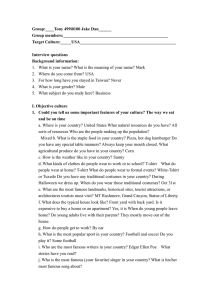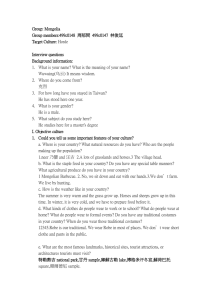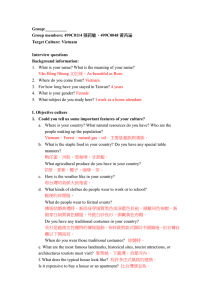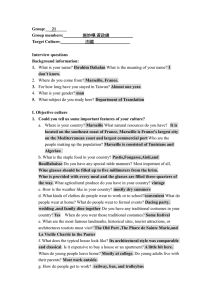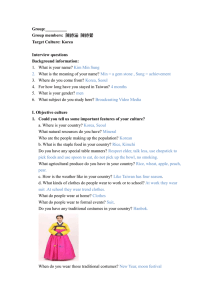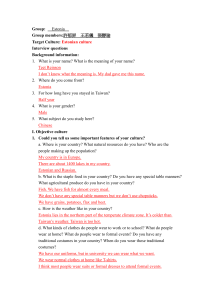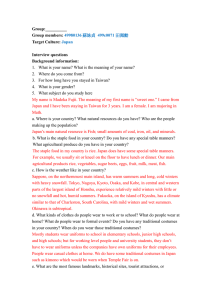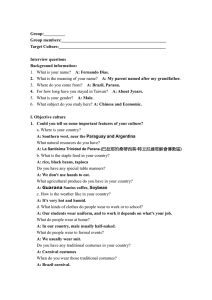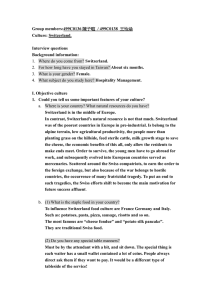Group:__________ Group members: Target Culture: Japan
advertisement
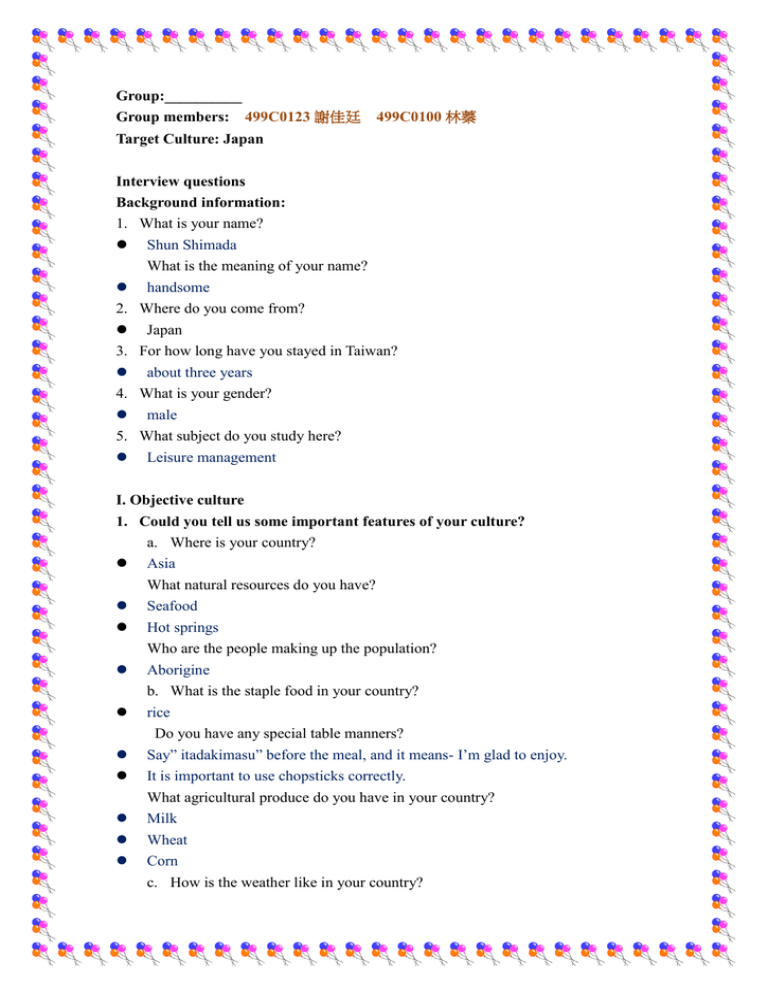
Group:__________ Group members: 499C0123 謝佳廷 499C0100 林蓁 Target Culture: Japan Interview questions Background information: 1. What is your name? Shun Shimada What is the meaning of your name? handsome 2. Where do you come from? Japan 3. For how long have you stayed in Taiwan? about three years 4. What is your gender? male 5. What subject do you study here? Leisure management I. Objective culture 1. Could you tell us some important features of your culture? a. Where is your country? Asia What natural resources do you have? Seafood Hot springs Who are the people making up the population? Aborigine b. What is the staple food in your country? rice Do you have any special table manners? Say” itadakimasu” before the meal, and it means- I’m glad to enjoy. It is important to use chopsticks correctly. What agricultural produce do you have in your country? Milk Wheat Corn c. How is the weather like in your country? Humid and warm in summer. Sunny and dry in winter. d. What kinds of clothes do people wear to work or to school? Suit to work and uniform to school. What do people wear at home? Casual clothes What do people wear to formal events? Bathrobe and kimono Do you have any traditional costumes in your country? Yes When do you wear those traditional costumes? Wedding Funeral Graduation ceremony e. What are the most famous landmarks, historical sites, tourist attractions, or architectures tourists must visit? Landmark-Disney land Historical sites-Kyoto temple Tourist attractions-shopping Architecture tourists-Nikko, World heritage f. What does the typical house look like? It is made by woods Is it expensive to buy a house or an apartment? Yes, it is very expensive. When do young people leave home? After graduated from college. Do young adults live with their parents? It depends on you. g. How do people get to work? Generality by train h. What is the most popular sport in your country? Soccer Do you play it? Yes i. Who are the most famous writers in your country? 村上春樹(Haruki Murakami) What stories have you read? 挪威的森林(Norwegian Wood) j. Who is the most famous (your favorite) singer in your country? Arashi What is his/her most famous song about? one love 2. Regarding the items mentioned in question 1, what differences do you find between your culture and Taiwanese culture? II. Subjective Culture 1. Could you tell us the subjective feature of your culture? a. Time: Is it important to be punctual? Of course important Do people always arrive on time? People usually arrive early. Is it ok to arrive late? No, it is impolite. b. Invitation: Is it normal to invite a friend to have dinner at home? Or people meet in the public places, like restaurants or cafés? Seldom Do you need to bring something if you are invited? Bring some gifts. c. Greeting: How do people greet each other when they meet? To make a salute. Do you shake hands, bow, hug, or kiss? Yes, I do. Bow and nod. What do you say to each other? Long time no see How do you do d. Agreement and disagreement: How do you express agreement or disagreement? Acceptance or refusal? Say yes or no e. Directness: Is it polite to be direct? Or do people tend to be indirect? No, it is impolite to be direct. People tend to be indirect. f. Do people use body language a lot? Seldom Is it polite to touch someone while speaking? No, people might be rude. g. Are there any taboos foreigners must know before visiting your countries? You must wear suit or formal dress in formal social place. Japanese tabooed sloppily dresses. Comb is not a proper gift You can’t thumbs up, because it is ungracious. What do you think are the underlying reasons of those taboos? 2. Regarding the items mentioned in question 2, what differences do you find between your culture and Taiwanese culture? III. 就你自己的經驗,對這個訪談活動有何心得感想: 1. 我覺得這個訪談活動有何優點? 了解不同國家的人和文化,增進自我的國際知識 2. 我學到什麼新的文化知識? 日本的禁忌和禮儀 例如 與日本人行見面禮 45 度尤佳,日本人最忌諱綠色 3. 我學到什麼新的語言或單字? 日本人在開動前要說的話(itadakimasu) 4. 我在和外籍學生中運用什麼溝通技巧來理解和表達? 大多用英文溝通,如果聽不懂就比手畫腳 5. 我覺得訪談活動有什麼缺點? 日本人說的英文腔有點聽不懂 導致我們花很多時間 6. 我在尋找國際學生訪談的過程是否有任何困難? 人很難找,時間很難配合
